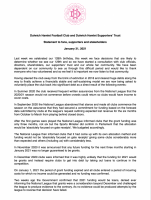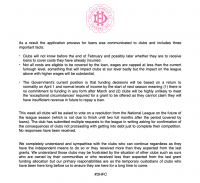Pink Panther
Well-Known Member
This press release on the official government website was widely reported two months ago. The £11m for the National League is there but it's a bit ambivalent, because an earlier paragraph referring to the overall figure of £300m for all sports says the funding will be "largely comprised of loans":At least two Freedom of Information requests have gone in asking for details of all relevant meetings/communications between DCMS/FA/National League to see if anything is recorded about the basis for any payments beyond December 2020.
Watch this space as they say.

Government announces £300 million Sport Winter Survival Package to help spectator sports in England
Major spectator sports in England will receive a combined £300 million cash injection to protect their immediate futures over the winter period
Frankly though, if I was negotiating to secure an eight figure sum of funding on behalf of an organisation representing 66 small and medium sized enterprises, I think I'd want to have at least an email of confirmation before I sat back and waited two months until the funding was actually needed.
I'm sure it was also reported back in October, when the original £10m grant was negotiated, that the money was coming from the National Lottery as the government could not award a direct grant of this nature, only a loan.
I'm not a supporter of this government by a long chalk but on the face of it they appear to have been fairly straight with us on this. Yet again I'll say I think it was a big mistake to begin the season behind closed doors in the first place. I don't feel it's achieved anything worthwhile, other than allowing a few hundred jobbing footballers to sign new contracts and get paid for an extra season, and it may well have caused lasting damage to some clubs.








